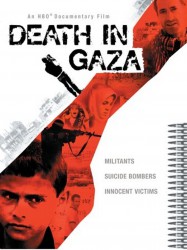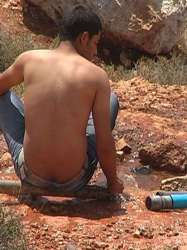Peace, Propaganda & the Promised Land est un film américain de genre Documentaire
Peace, Propaganda & the Promised Land (2004)

Si vous aimez ce film, faites-le savoir !
Durée 1h20
OrigineEtats-Unis
Genres Documentaire
Themes Afrique post-coloniale, Religion, Documentaire sur le droit, Documentaire sur la guerre, Documentaire historique, Documentaire sur une personnalité, Documentaire sur la politique, Documentaire sur la religion, Politique, Religion juive
Note81%










Peace, Propaganda & the Promised Land is a 2004 documentary by Sut Jhally and Bathsheba Ratzkoff which—according to the film's official website—"provides a striking comparison of U.S. and international media coverage of the crisis in the Middle East, zeroing in on how structural distortions in U.S. coverage have reinforced false perceptions of the Israeli-Palestinian conflict" and which "analyzes and explains how--through the use of language, framing and context--the Israeli occupation of the West Bank and Gaza remains hidden in the news media". The film argues that the influence of pro-Israel media watchdog groups, such as CAMERA and Honest Reporting, has led to distorted and pro-Israel media reports. It features Noam Chomsky, Robert Jensen, Hanan Ashrawi, Sam Husseini, and Robert Fisk, among others.
In its response to the movie, the pro-Israel JCRC criticized the film for not discussing the influence of "the numerous pro‐Palestinian media watchdog groups, including FAIR (Fairness and Accuracy in Reporting, which describes itself as 'A National Media Watch Group'), whose spokesperson played a prominent role in the film".
According to LiP magazine, the movie "offers a great starting point for thinking about media misrepresentation of the Israel-Palestinian conflict, and useful analysis of how language is used to manipulate public opinion," but is short on "solid statistics and facts to back up some of its blanket statements". A review in The New York Times by Ned Martel found that the film "largely ignores Palestinian leadership, which has surely played a part in the conflict's broken vows and broken hearts. And such a lack of dispassion weakens the one-sided film's bold and detailed argument".
Commentaires
Postez un commentaire :
Suggestions de films similaires à Peace, Propaganda & the Promised Land
Il y a 8973 ayant les mêmes genres cinématographiques, 13323 films qui ont les mêmes thèmes (dont 55 films qui ont les mêmes 10 thèmes que Peace, Propaganda & the Promised Land), pour avoir au final 70 suggestions de films similaires.Si vous avez aimé Peace, Propaganda & the Promised Land, vous aimerez sûrement les films similaires suivants :

State 194 (2012)
, 1h38Origine Israel
Genres Documentaire
Thèmes Afrique post-coloniale, Religion, Documentaire sur le droit, Documentaire sur la guerre, Documentaire historique, Documentaire sur une personnalité, Documentaire sur la politique, Documentaire sur la religion, Politique, Religion juive
Note57%





The documentary follows the plan that Palestinian Prime Minister Salam Fayyad puts forth in 2009 for the Palestinians to achieve statehood. It follows the progress made by the Palestinians but also "the political quagmire" that threatens the progress. The documentary shows the following people:
 , 1h25
, 1h25Réalisé par Yolande Zauberman
Origine France
Genres Documentaire
Thèmes Afrique post-coloniale, Religion, Sexualité, Documentaire sur le droit, Documentaire sur la guerre, Documentaire historique, Documentaire sur une personnalité, Documentaire sur la politique, Documentaire sur la religion, Politique, Religion juive
Acteurs Juliano Mer-Khamis
Note58%





Dans les bars de Tel Aviv, la nuit, la réalisatrice demande à des jeunes Juifs s'ils auraient des relations sexuelles avec des Arabes, et à des jeunes Arabes s'ils feraient l'amour avec des Juifs. Chacun donne son avis, avec plus ou moins d'explications, sur le symbole que cela peut représenter pour eux (beaucoup l'ont déjà fait) ou au contraire leur refus. Des jeunes issus de familles mixtes (un parent juif, l'autre arabe) sont également interviewés. Le film recueille aussi les témoignages du journaliste Gideon Levy et de l'acteur Juliano Mer-Khamis, de mère juive et de père arabe, assassiné en 2011 par des Palestiniens à Jénine.

Death in Gaza (2004)
, 1h20Réalisé par James Miller
Genres Documentaire
Thèmes Afrique post-coloniale, Religion, Documentaire sur le droit, Documentaire sur la guerre, Documentaire historique, Documentaire sur une personnalité, Documentaire sur la politique, Documentaire sur la religion, Politique, Religion juive
Acteurs James Miller, Saira Shah
Note79%






Arab Israeli Dialogue (1974)
, 40minutesRéalisé par Lionel Rogosin
Origine Etats-Unis
Genres Documentaire
Thèmes Afrique post-coloniale, Religion, Documentaire sur le droit, Documentaire sur la guerre, Documentaire historique, Documentaire sur une personnalité, Documentaire sur la politique, Documentaire sur la religion, Politique, Religion juive

The Gatekeepers (2012)
, 1h35Origine France
Genres Guerre, Documentaire, Action, Historique
Thèmes Afrique post-coloniale, Espionnage, Religion, Le terrorisme, Documentaire sur le droit, Documentaire sur la guerre, Documentaire historique, Documentaire sur une personnalité, Documentaire sur la politique, Documentaire sur la religion, Documentaire sur le terrorisme, Politique, Religion juive
Note75%





Dror Moreh a décidé de réaliser ce film après avoir mesuré l'importance décisive du Shabak (Shin Beth) sur la scène politique israélienne depuis quarante ans. Ces six directeurs à la retraite de la sécurité israélienne évoquent leurs victoires et les échecs passés sans nostalgie. Très critiques vis-à-vis des politiques menées par leurs gouvernements (à l'exception de celui d'Yitzhak Rabin), ils défendent tous un changement radical de politique en Israël : la recherche de la paix et la reconnaissance au plus tôt de l’État palestinien.

The Making of a Martyr (2006)
Origine Canada
Genres Documentaire
Thèmes Afrique post-coloniale, Religion, Le terrorisme, Documentaire sur le droit, Documentaire sur la guerre, Documentaire historique, Documentaire sur une personnalité, Documentaire sur la politique, Documentaire sur la religion, Documentaire sur le terrorisme, Politique, Religion juive, Religion musulmane
Note69%






...More Than 1000 Words (2006)
, 1h18Origine Israel
Genres Documentaire
Thèmes Afrique post-coloniale, Religion, Documentaire sur l'art, Documentaire sur le droit, Documentaire sur la guerre, Documentaire historique, Documentaire sur une personnalité, Documentaire sur la politique, Documentaire sur la religion, Politique, Religion juive
Acteurs Galit Gutmann
Note74%






Occupation 101 (2006)
, 1h30Origine Etats-Unis
Genres Documentaire
Thèmes Afrique post-coloniale, Politique, Religion, Documentaire sur le droit, Documentaire sur la guerre, Documentaire historique, Documentaire sur une personnalité, Documentaire sur la politique, Documentaire sur la religion, Politique, Religion juive
Note80%






500 Dunam on the Moon (2002)
Origine Etats-Unis
Genres Documentaire
Thèmes Afrique post-coloniale, Religion, Documentaire sur le droit, Documentaire sur la guerre, Documentaire historique, Documentaire sur une personnalité, Documentaire sur la politique, Documentaire sur la religion, Politique, Religion juive

Zramim Ktu'im (2010)
, 1h15Origine Israel
Genres Documentaire
Thèmes Afrique post-coloniale, L'environnement, Religion, Documentaire sur le droit, Documentaire sur l'environnement, Documentaire sur la guerre, Documentaire historique, Documentaire sur une personnalité, Documentaire sur la politique, Documentaire sur la religion, Politique, Religion juive
Paths of lives are crossed in one village in the West Bank. Along the broken water pipelines, villagers walk on their courses towards an indefinite future. Israel that controls the water, supplies only a small amount of water, and when the water streams are not certain nothing can evolve. The control over the water pressure not only dominates every aspect of life but also dominates the spirit. Bil-in, without spring water, is one of the first villages of the West Bank where a modern water infrastructure was set up. Many villagers took it as a sign of progress, others as a source of bitterness. The pipe-water was used to influence the people so they would co-operate with Israel’s intelligence. The rip tore down the village. Returning to the ancient technique of collecting rainwater-using pits could be the villagers’ way to express independence but the relations between people will doubtfully be healed.
 Connexion
Connexion